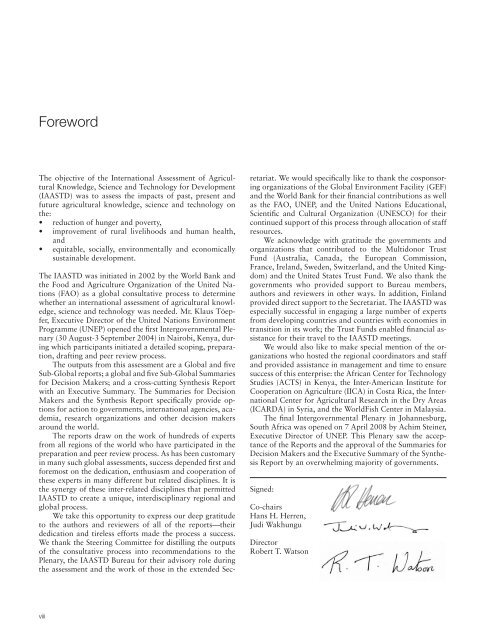Agriculture_at_a_Crossroads_Volume%20V_Sub-Saharan%20Africa_Subglobal_Report
Agriculture_at_a_Crossroads_Volume%20V_Sub-Saharan%20Africa_Subglobal_Report
Agriculture_at_a_Crossroads_Volume%20V_Sub-Saharan%20Africa_Subglobal_Report
Create successful ePaper yourself
Turn your PDF publications into a flip-book with our unique Google optimized e-Paper software.
Foreword<br />
The objective of the Intern<strong>at</strong>ional Assessment of Agricultural<br />
Knowledge, Science and Technology for Development<br />
(IAASTD) was to assess the impacts of past, present and<br />
future agricultural knowledge, science and technology on<br />
the:<br />
• reduction of hunger and poverty,<br />
• improvement of rural livelihoods and human health,<br />
and<br />
• equitable, socially, environmentally and economically<br />
sustainable development.<br />
The IAASTD was initi<strong>at</strong>ed in 2002 by the World Bank and<br />
the Food and <strong>Agriculture</strong> Organiz<strong>at</strong>ion of the United N<strong>at</strong>ions<br />
(FAO) as a global consult<strong>at</strong>ive process to determine<br />
whether an intern<strong>at</strong>ional assessment of agricultural knowledge,<br />
science and technology was needed. Mr. Klaus Töepfer,<br />
Executive Director of the United N<strong>at</strong>ions Environment<br />
Programme (UNEP) opened the first Intergovernmental Plenary<br />
(30 August-3 September 2004) in Nairobi, Kenya, during<br />
which participants initi<strong>at</strong>ed a detailed scoping, prepar<strong>at</strong>ion,<br />
drafting and peer review process.<br />
The outputs from this assessment are a Global and five<br />
<strong>Sub</strong>-Global reports; a global and five <strong>Sub</strong>-Global Summaries<br />
for Decision Makers; and a cross-cutting Synthesis <strong>Report</strong><br />
with an Executive Summary. The Summaries for Decision<br />
Makers and the Synthesis <strong>Report</strong> specifically provide options<br />
for action to governments, intern<strong>at</strong>ional agencies, academia,<br />
research organiz<strong>at</strong>ions and other decision makers<br />
around the world.<br />
The reports draw on the work of hundreds of experts<br />
from all regions of the world who have particip<strong>at</strong>ed in the<br />
prepar<strong>at</strong>ion and peer review process. As has been customary<br />
in many such global assessments, success depended first and<br />
foremost on the dedic<strong>at</strong>ion, enthusiasm and cooper<strong>at</strong>ion of<br />
these experts in many different but rel<strong>at</strong>ed disciplines. It is<br />
the synergy of these inter-rel<strong>at</strong>ed disciplines th<strong>at</strong> permitted<br />
IAASTD to cre<strong>at</strong>e a unique, interdisciplinary regional and<br />
global process.<br />
We take this opportunity to express our deep gr<strong>at</strong>itude<br />
to the authors and reviewers of all of the reports—their<br />
dedic<strong>at</strong>ion and tireless efforts made the process a success.<br />
We thank the Steering Committee for distilling the outputs<br />
of the consult<strong>at</strong>ive process into recommend<strong>at</strong>ions to the<br />
Plenary, the IAASTD Bureau for their advisory role during<br />
the assessment and the work of those in the extended Sec-<br />
viii<br />
retari<strong>at</strong>. We would specifically like to thank the cosponsoring<br />
organiz<strong>at</strong>ions of the Global Environment Facility (GEF)<br />
and the World Bank for their financial contributions as well<br />
as the FAO, UNEP, and the United N<strong>at</strong>ions Educ<strong>at</strong>ional,<br />
Scientific and Cultural Organiz<strong>at</strong>ion (UNESCO) for their<br />
continued support of this process through alloc<strong>at</strong>ion of staff<br />
resources.<br />
We acknowledge with gr<strong>at</strong>itude the governments and<br />
organiz<strong>at</strong>ions th<strong>at</strong> contributed to the Multidonor Trust<br />
Fund (Australia, Canada, the European Commission,<br />
France, Ireland, Sweden, Switzerland, and the United Kingdom)<br />
and the United St<strong>at</strong>es Trust Fund. We also thank the<br />
governments who provided support to Bureau members,<br />
authors and reviewers in other ways. In addition, Finland<br />
provided direct support to the Secretari<strong>at</strong>. The IAASTD was<br />
especially successful in engaging a large number of experts<br />
from developing countries and countries with economies in<br />
transition in its work; the Trust Funds enabled financial assistance<br />
for their travel to the IAASTD meetings.<br />
We would also like to make special mention of the organiz<strong>at</strong>ions<br />
who hosted the regional coordin<strong>at</strong>ors and staff<br />
and provided assistance in management and time to ensure<br />
success of this enterprise: the African Center for Technology<br />
Studies (ACTS) in Kenya, the Inter-American Institute for<br />
Cooper<strong>at</strong>ion on <strong>Agriculture</strong> (IICA) in Costa Rica, the Intern<strong>at</strong>ional<br />
Center for Agricultural Research in the Dry Areas<br />
(ICARDA) in Syria, and the WorldFish Center in Malaysia.<br />
The final Intergovernmental Plenary in Johannesburg,<br />
South Africa was opened on 7 April 2008 by Achim Steiner,<br />
Executive Director of UNEP. This Plenary saw the acceptance<br />
of the <strong>Report</strong>s and the approval of the Summaries for<br />
Decision Makers and the Executive Summary of the Synthesis<br />
<strong>Report</strong> by an overwhelming majority of governments.<br />
Signed:<br />
Co-chairs<br />
Hans H. Herren,<br />
Judi Wakhungu<br />
Director<br />
Robert T. W<strong>at</strong>son


